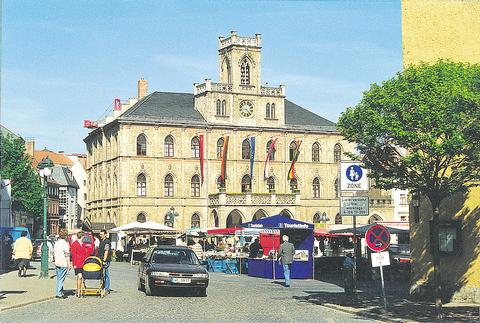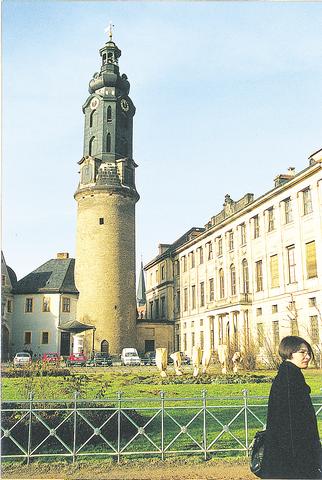The city of Weimar is located in the middle of Germany, in the state of Thuringia, which is also known as "the green heart of Germany." Every year the city, home to some 60,000 people, attracts thousands of visitors and is fast becoming a place of international dialogue focusing on history, mankind's origins and future. It is also turning into an important center for the development of ideas for the designs and hopes of a new Europe -- two years ago Weimar was chosen to be the Cultural Capital of Europe -- the first city in the former Eastern bloc to have that honor.
The city epitomizes the history of Germany and Europe: It was home and inspiration to classical poets, writers, composers and artists such as Goethe, Schiller, Liszt, Nitzsche, and the artists of the legendary Bauhaus. A trip to Weimar promises to be an experience in the culture, history and future of Europe.

PHOTO: TOURIST INFORMATION WEIMAR
The history of Weimar represents both a challenge and a responsibility. The town of poets, Fine Arts, the origin of political decisions, and more recently a place of National Socialist barbarity, is presenting itself and its inheritance in a wealth of events for discussions about the past, the present and the future. Recognition of the grand importance of the history of Weimar, is the inclusion of the cultural assets "Classical Weimar" in the world heritage list of UNESCO. The unique "genius huius loci" ("spirit of this place") is particularly important in attracting people from all over the world. The "Legend of Weimar," is the unique exciting relationship between intellectual greatness and communal spirit.

PHOTO: TOURIST INFORMATION WEIMAR
Poets, Philosophers
The town of classical German literature, the place where Goethe and Schiller, Wieland and Herder worked -- these are the images of Weimar for the majority of the visitors. For Friedrich Nietzsche, the philosopher, whose death's 101st anniversary is honored this year, Weimar was the last station in his life. Almost his complete estate is administered and maintained in the city. Johann Wolfgang von Goethe spent more than 50 years of his life in this town and famous works such as Goethe's Faust -- poetry, Iphigenia on Tauris and Egmont, Wieland's History of the Abredites or Herder's Letters of Humanity were created in, and emanated from Weimar. The glory of this history is reflected in the architectural imprint the period has left on the city.
Fine arts
Not only the written word but also fine arts raise Weimar to an outstanding position in European cultural history. The examples range from the old masters such as Lucas Cranach to Max Liebermann, one of the best known pupils of the "Weimar School of Art" (founded in 1860 as an art school supported by the Grand Duke Carl Alexander), to the modern Art of the state Bauhaus. The notion of Universal Art espoused by the Bauhaus, the impulses from Kandinsky, Feininger, Gropius and their artist colleagues were to revolutionize design and architecture, and are still having an effect to the present day.
The Weimar Art Collections unite the masterpieces of painting, sculpture and art craftsmanship throughout various epochs in the Palace Museum. Three years ago the Maenz collection was installed in the New Museum Weimar, paying homage to Modernism.
Music
Music heritage is also rich in Weimar and began with the great Johann Sebastian Bach. This year the 251st anniversary of his death will be celebrated. Some of his most important cantatas were composed in Weimar when he was concert master and court orga-nist.
Franz Liszt made Weimar the center of music in the 19th century when he was Court Director of Music. The College of Music in Weimar is named after him. Master's courses are held there each summer under the leadership of well-known international stars of the music world.
The Belvedere Palace houses a grammar school for music whose pupils already enrich the music program in Weimar today with their talents. The town is also home to an orchestra that is renowned not just in Germany but abroad as well.
Theatre
There has been a lively theatre culture in Weimar since the end of the 17th century. The theatre troupes were originally housed in the Royal Palace and then later made guest appearances in small private theatres. A permanent court theatre was founded in 1791 whose style and repertoire were directed by Goethe at first.
Its international rank was maintained throughout the centuries and this place of theatre culture has been home to the German National Theater since 1919. It is not only that great poets spoke on this stage but also great politicians in the shape of the founding fathers of the Weimar Republic, established in 1919. This connection of culture at the highest level to great historical events particularly enhances the theatre scene in Weimar.
Inspiration
Those who visit the many places of culture in Weimar will get to know the hospitality of the town as well. "Where can you find so much good in such a small space?" -- wrote Goethe. Words that are as true today as when their author lived, and describe the hospitality of Weimar at its best.
In catering however, whether Thuringian or international cuisine, whether serving sausages or haute cuisine, is where Weimar is at its best. The many bars, restaurants and cafes, often in an historical ambience, invite the guest to relax. If wishing to escape from the countless historical impressions in Weimar, the guest has a multitude of options for accommodation, in all varieties.
Landscape
Weimar is actually a town within a park. The town is surrounded by historical gardens and parks which envelop it like a green wreath. Formed by the landscape gardening of the 18th century the grounds still invite the visitor to stroll around. The path leads along the river Ilm from the Town Palace past Goethe's Garden House to the Baroque Palace of Belvedere. The landscaped park of the ducal summer residence with the Orangery is a yearly attraction to those interested in landscape architecture. Just outside the town is the park of Tiefurt Palace. The hexagonal white colonnaded temple at the center of the landscaped garden is dedicated to the Muse of singing Polyhymnia.
Around Weimar
From Weimar it's only a stone's throw to other beautiful and interesting cities such as Jena or Erfurt. The nearby medieval Thuringian Forest, where Charlemagne used to hunt over 1,000 years ago, gives you plenty of possibilities to walk and enjoy the unspoilt beauty of nature. In the state of Thuringia as a whole, you can also find plenty of old castles, palaces and historical sights each telling its own story and forming a unique link in the history of Germany. Visit website: www.weimar.de

US president-elect Donald Trump said he would “never say” if Washington is committed to defending Taiwan from China, but “I would prefer that they do not do it [ an attack],” adding that he has a “good relationship” with Chinese President Xi Jinping (習近平). “I never say because I have to negotiate things, right?” Trump said in an interview with NBC’s Meet the Press host Kristen Welker after saying he would not reveal his incoming administration’s stance on Taiwan’s defense in the event of an attack. Asked the question again, Trump, in a reference to China, said: “I would prefer that they

CROSS-STRAIT TENSIONS: MOFA demanded Beijing stop its military intimidation and ‘irrational behavior’ that endanger peace and stability in the Indo-Pacific region The Presidential Office yesterday called on China to stop all “provocative acts,” saying ongoing Chinese military activity in the nearby waters of Taiwan was a “blatant disruption” of the “status quo” of security and stability in the Indo-Pacific region. Defense officials said they have detected Chinese ships since Monday, both off Taiwan and farther out along the first island chain. They described the formations as two walls designed to demonstrate that the waters belong to China. The Ministry of National Defense yesterday said it had detected 53 military aircraft operating around the nation over the past 24 hours, as well

TECHNICAL LEAD: The US needs to boost its missile technology and build a communications network able to withstand hackers, Admiral Samuel Paparo said US Indo-Pacific Commander Admiral Samuel Paparo said the US is confident it could defeat China in the Pacific, but that technical advantage is shrinking, the Washington Post reported yesterday. Speaking at the Reagan Defense Forum on Saturday, Paparo said the US needs to maintain its technical lead over China by enhancing missile technology and building a communications network able to withstand hackers, the paper reported. Although the US is able to hit long-distance and difficult targets with its advanced cruise missile system, each launch costs more than US$1 million, he said. By contrast, drones, which are relatively cheap to build and develop, can

‘LAGGING BEHIND’: The NATO secretary-general called on democratic allies to be ‘clear-eyed’ about Beijing’s military buildup, urging them to boost military spending NATO Secretary-General Mark Rutte mentioning China’s bullying of Taiwan and its ambition to reshape the global order has significance during a time when authoritarian states are continuously increasing their aggression, the Ministry of Foreign Affairs (MOFA) said yesterday. In a speech at the Carnegie Europe think tank in Brussels on Thursday, Rutte said Beijing is bullying Taiwan and would start to “nibble” at Taiwan if Russia benefits from a post-invasion peace deal with Ukraine. He called on democratic allies to boost defense investments and also urged NATO members to increase defense spending in the face of growing military threats from Russia